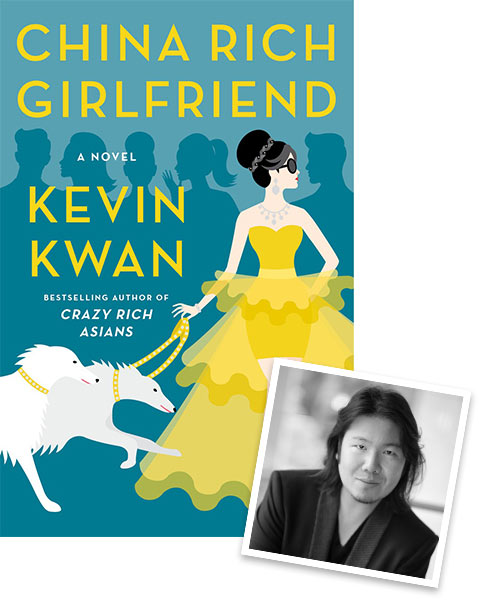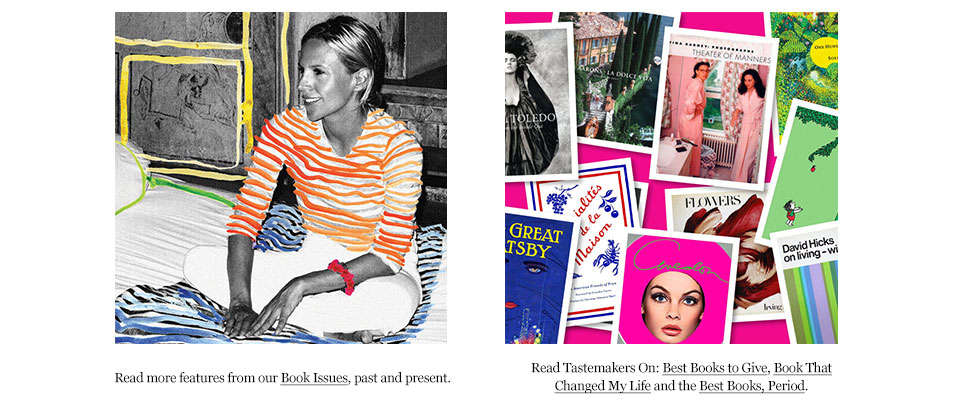
In 2013, creative consultant-turned-author Kevin Kwan exploded on the scene with Crazy Rich Asians, which turned the spotlight on uber-wealthy, nouveau-affluent Asian society. It was Bergdorf Blondes in the Far East, Dynasty with less Carringtons and shoulder pads and more Youngs, Leongs and climate-controlled closets — and the novel quickly became a bestseller with its delicious send-up of that over-the-top culture.
The good news for fans of Kwan’s book: he’s back with a sequel, China Rich Girlfriend, and revealed there’s actually a whole trilogy in store for the moneyed world he’s invented (or, depending on whom you ask, thinly veiled). Whereas in Crazy Rich Asians the focus was on protagonist Rachel, an Asian American, moving to Singapore and meeting her boyfriend’s “crazy rich” family, in this new story the locale shifts to mainland China as Rachel, now set to marry that beau, meets the father she never knew. And he is, yes, insanely rich.
Discover more about the series in our conversation with the Singapore-born Kwan — plus, get the scoop on the online store and film revolving around his absurdly, outrageously, fabulously well-heeled world.
“China rich” is…
The level of rich that’s beyond crazy rich and filthy rich. There’s no other way to describe it. It’s a world of extreme instant wealth. We’re talking about people with billions of dollars and who made it within the last 10 years or less. The way they live, the way they spend is totally different from anyone else because when you’ve made a vast fortune that quickly, you tend to spend it much more quickly too — as opposed to someone who’s been in a family that’s spent generations building a fortune and is much more careful. As someone I know says, easy come, easy go.
The origins of China Rich Girlfriend…
I always thought of this book as part of a trilogy, even before I began [my first novel] Crazy Rich Asians. This was always planned to be the next installment. I wanted to start in Singapore [where Crazy Rich Asians takes place] and show this overseas, old money Chinese world and then move the action to China, where there’s all this new money action happening now.
How I researched this book…
A few of the inspiration points came from things that were happening in the news as well as anecdotal evidence I had been hearing — you know, the outrageous antics of the kids of wealthy Chinese, like getting into high-stakes drag races. I also made several trips to China because, for me, it was important to be breathing the air of the rooms I wrote about, meeting these people and getting a chance to look at their lives through their point of view.
An anecdote from one of those trips…
On one of my trips, it was arranged for me to meet this very young billionaire in Shanghai — he was in his early Thirties, had several billion dollars and was a major player on the scene. He was actually a fan of my last book and wanted to meet me. So we met at his ultra-exclusive private club — which, I was told, had only eight official members — at this beautiful garden mansion. It was interesting to meet him and learn more about what motivates him. He’s an extremely unostentatious person, which is in such contrast to what you normally see in China. For him, health, family, his children’s future are much more important than spending money on the latest designer fashions or driving a Lamborghini. A shift is beginning where the spending has become much more private and geared towards a different aspiration — as opposed to just ostentation.
Favorite scene in the book…
I really loved writing the whole Paris shopping scene. There’s a section of the book where a crowd of China rich girls decide to go, on the spur of a moment, to Paris to shop. They were just at a fashion show in Shanghai and were really unsatisfied by what they were seeing. They felt that all these designers were really pandering to a Chinese audience. They were, like, where is the real stuff, the good stuff? So they decide to go to Paris. I describe the trip through the eyes of Rachel Chu, who recounts the craziness of the week, the private couture shows, the hotels… At the end of the day, she goes back to the hotel and bumps into one of the main character’s mother — this is the woman who’s made the fortune her daughter is spending — and she’s in a room in this tricked-out hotel suite at the Shangri-La with the other mothers… and they’re cooking ramen over a little hot pot. They can’t stand eating French food with the cheese and butter and stuff like that, giving them indigestion, so they brought ramen with them. I’ve literally witnessed scenes like this.
What’s changed since my first book came out in 2013…
Two interesting things have happened. One, China’s only gotten richer since my original story began. When that came out, there were only, like, 190 billionaires in China. Now, at last count, there are 352. It’s almost doubled. It’s amazing to see how rich it’s gotten exponentially, even in the last two years. The other interesting facet is that the government in China has really launched a crackdown against corruption and graft; part of it is this new austerity campaign. Previously, a lot of people connected to the government were used to spending vast amounts of money, throwing parties, entertaining people and things like that — that has been, officially at least, clamped down on. A lot of the outrageousness has gone covert. It’s still happening but just not as public anymore.
And these changes affected China Rich Girlfriend by…
People are still living large, but that’s become much more private and insular. And this has really become a theme in the new book where you have the young generations, who are still trying to live life to the max, and the older generation being very worried for them, trying to rein them in and prevent any scandals. That forms the central themes of the new book.
My books strike a chord and resonate because…
Crazy Rich Asians was the first book to really talk about contemporary China in new ways that defied all sorts of stereotypes. The West thinks it knows about China, but the book revealed a new facet to the culture. That and I also think people have always enjoyed reading about the rich. You know, even back in the Renaissance, people would read Machiavelli to learn what was happening with the Medici family. It’s progressed for centuries, from Anthony Trollope to Edith Wharton to Jane Austen. These comedy of manners that dealt with the foibles of the very rich — that’s always fascinated people.
The light-bulb moment behind my writing these books…
My first degree was in creative writing, so even back in collage, I had this idea of writing about this strange childhood I had. And I’ve lived in New York for over 20 years — my life is pretty normal — but whenever I went to Asia, I would be immersed in this other world of crazy rich Asians. Like, I’d arrive in Hong Kong and there would be four maids waiting at the airport to take my bags — that’s nice, but I can carry my own bags, you know? Just the level of extravagance and service. I would come back with stories for my New York friends and they’d tell me to write about them. So one day, I finally said, I’m going to do it.
Most memorable reactions I’ve gotten, for better or worse…
A lot of people have told me they’ve met people who claimed they were the inspiration for Astrid [one of the “Medicis of Asia”]. I guess I should take that as a compliment, right? I’ve gotten really poignant letters from people in their Twenties and late teens who come from what is now known as CRA [crazy rich Asian] families: “Thank you for writing this book, I thought I was going crazy, I thought my family was the weirdest… until I read your book and realized, oh my God, we’re all the same.” It’s great to see that it had a very personal impact on people and helped them understand and appreciate their situation more, and hopefully grow from it.
About that film treatment for Crazy Rich Asians…
Color Force, the team behind The Hunger Games, is producing the movie. Pete Chiarelli [The Proposal] did the proposal. I just got an email from him — he’s almost done with the final polish. Once we have a working script, we can start the casting process.
And my ideal cast…
I envision every single actress and actor that I want for each role. But I think it would be unfair to the other actors who are trying out for the movie. So I would say, I’m totally open to seeing what happens in the audition process. There’s so much great untapped talent out there that I’m sure it’ll be an embarrassment of riches.
As for my online shop, Crazy Rich Collection…
We thought it would be a fun way to engage the reader. Because so much of the book is based on shopping and materials and consuming, we built a little pop-up shop that relates to the characters in my books. There’s amazing clothes, jewelry, spa experiences… We’re not making any money off of this. I just thought it would be a nice treat for my readers to get another facet of this world.
What’s next for consumer culture in China…
I think there’s already been a bit of a slowdown because of the Chinese economy itself. As I mentioned, the Chinese government is trying to crack down on corruption and too much spending, so that reins people in. You’re going to see an evolution of how people spend and a level of sophistication that’s increasing — it’s going to be a less-is-more thing, just like it happened in the West. Except everything is accelerated in China. The way it took a hundred years for the U.S. to go from robber barons buying old palaces in Europe to elegant East Coasters finally sort of being accepted by European aristocracy… In China, it’s happening at warp speed.
And words of advice for those visiting mainland China…
Really go in with an adventurous spirit — because it’ll never be what you think it is, but it’ll always be something far more rewarding. And know that — especially with the Chinese — they’ll never say no to you. Sometimes yes means no, you know what I mean? So they’ll agree, they’ll nod, but… It’s very nuanced.

